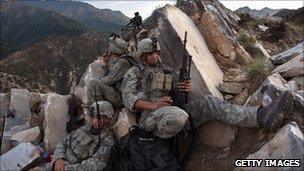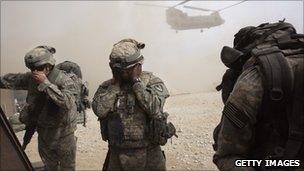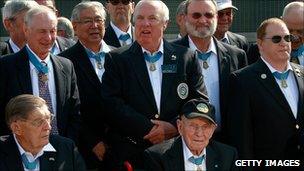Obama gives Medal of Honor to soldier for Afghan feats
- Published
Sgt Giunta has said he would wear the medal in honour of other soldiers
A quietly-spoken soldier from a small town in Iowa is the first living recipient of America's highest military decoration since the Vietnam War.
President Barack Obama presented the Medal of Honor to 25-year-old Staff Sgt Salvatore Giunta at the White House.
He received the decoration for "acts of gallantry at the risk of his life above and beyond the call of duty" while serving in Afghanistan.
Sgt Giunta has said he was just doing what any other soldier would have done.
He served two tours in Iraq and had previously received a Bronze Star and a Purple Heart for his service.
Since the Vietnam War, the Medal of Honor has only been awarded for nine acts of bravery, with Sgt Giunta the only recipient to receive it while living.
"It is my privilege to present our nation's highest military decoration to a soldier as humble as he is heroic," Mr Obama said at the White House ceremony.
He called the ceremony a "joyous" occasion and said he had been looking forward to it.
"I'm going to go off script here and say I really like this guy," Mr Obama said, to great applause.
The award can be life-changing. As a Medal of Honor recipient, it is highly unlikely Sgt Giunta, from the 6,500-person town of Hiawatha, will be sent back into battle, but he may return to Iraq or Afghanistan in a morale-boosting role.
He is also entitled to a $1,000 (£620) monthly pension from the US Department of Veterans Affairs, a guaranteed seat at presidential inaugurations, and special housing privileges on military bases.
He joins 86 other living recipients of the prestigious award, who earned the honour in the decades up to the end of the Vietnam War.
Valley of Death
On his second tour in Afghanistan, Sgt Giunta was stationed in the Korengal Valley, a remote Taliban stronghold in the north-eastern province of Kunar.

US forces have since abandoned their outpost in the treacherous Korengal Valley
The region is so dangerous that US troops dubbed it the "Valley of Death." Forty-two American servicemen died serving in the Korengal valley before US forces abandoned their outpost there in April 2010.
Sgt Giunta's acts of bravery occurred on the night of 25 October, 2007.
Two days earlier, popular Staff Sgt Larry Rougle had been killed when his position on "Honcho Hill" was attacked.
Listening in to Taliban radio conversations, American forces learned that their enemy felt emboldened by this attack and hoped to bring back "a body" on their next encounter.
Sgt Giunta's platoon had been sent to recover US equipment from Honcho Hill. On its way back to base, the eight-man squad, walking single file along a rocky ridge under cover of moonlight, was attacked by Taliban fighters who approached in an L-shaped formation.
Later, Sgt Giunta would tell CBS's Sixty Minutes programme, external that the attack was "perfectly" co-ordinated. He said the platoon was being fired upon from "less of a distance than you can throw a baseball".
Hero story
Sgt Giunta, then 22, was fourth in line when the firing began and immediately jumped into a ditch. Squad leader Sgt Erick Gallardo, walking just in front of Sgt Giunta, came under fire and was struck in the head. His helmet stopped the bullet but he was knocked flat on his back.

Forty-two American servicemen have died fighting in the Korengal Valley
Sgt Giunta ran to the squad leader, and, while dragging him to safety, was shot twice. He was saved by his body armour.
After Sgt Gallardo had been pulled him to safety, the two soldiers noticed that the second man in line, Specialist Frank Eckrode, had been downed.
They threw grenades, opened fire and ran to their comrade. As Sgt Gallardo tended to Spc Eckrode's wounds - he had been shot four times - Sgt Giunta saw his close friend Sgt Joshua Brennan being carried off by two Taliban fighters.
Sgt Giunta pursued the enemy under heavy fire across an open clearing. His only cover was the dust kicked up by bullets and grenades. He killed one of the Taliban fighters - a sought-after foe known as Mohammed Tali - and the other fled.
Sgt Giunta carried the badly wounded Sgt Brennan to safety, where they remained for half an hour until a medevac helicopter arrived.
"He was still conscious. He was breathing. He was asking for morphine. I said, 'You'll get out and tell your hero stories,' and he was like, 'I will, I will'," Sgt Giunta told New York Times Magazine, external correspondent Elizabeth Rubin on the day following the attack.
Sgt Brennan died in surgery that night.
'I'm mediocre'
The squadron's medic, Spc Hugo Mendoza, was killed in the fighting. Sgt Giunta recalled to Rubin the long moments of waiting, hearing Spec Mendoza cry out from a nearby ditch: "I'm dying. I'm bleeding out."

Sgt Giunta joins just 86 other living Medal of Honor recipients
The entire attack had lasted about three minutes.
Sgt Gallardo began the process of nominating Sgt Giunta for the Medal of Honor from his hospital bed on the night the attack occurred.
Sgt Giunta is now stationed in Vicenza, Italy.
In interviews, he seems uncomfortable with his new fame, insisting at a Pentagon press conference, "I'm a regular line soldier", and telling 60 Minutes that he was still not at peace with what happened that night in Korengal.
When asked by CBS's Lara Logan, external what kind of soldier he was, Sgt Giunta replied: "I'm average. I'm mediocre... I don't think I did anything that anyone else I was with wouldn't have done. I was in a position to do it. That was what needed to be done. So that's what I did."
- Published16 November 2010
- Published15 November 2010
- Published16 November 2010
- Published15 November 2010